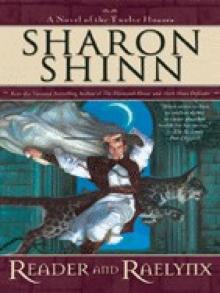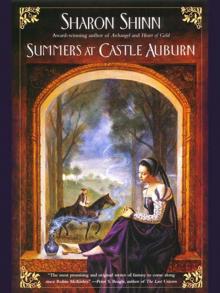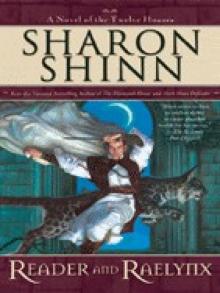- Home
- Sharon Shinn
The Shape-Changer's Wife Page 3
The Shape-Changer's Wife Read online
Page 3
“We must go there sometime,” Aubrey said, not entirely sure of what he was saying. “How far is it to walk?”
“Not too far, if you are willing to take a day or two to get there.”
“Then we will go sometime.”
And she opened her green eyes and looked straight at him, and he felt all his easy charm and all his light nonsense fall away from him. “Perhaps we will,” she said, and shut her eyes again.
Aubrey took a step backward and then a step away, feeling unaccountably shaken. Blindly, he turned his attention to the landscape before him, a few picturesque trees around a smoky gray lake, with ripe summer grass making a clearing around it. As he watched, two squirrels raced down one tree and across the clearing and up another tree; orioles made a black and flame-colored pattern against the sky. The pond rippled with the promise of fish, and the chirrup and drone of insects made a pleasant background noise.
“No wonder Orion is so successful hunting,” Aubrey remarked, just to be saying something. “The forest seems full of game.”
Lilith opened her eyes again, and this time they were ordinary eyes, except for their extraordinary color. “Here, it is,” she said. “You must walk some distance from our house to find much to kill.”
Aubrey considered, and could not remember seeing a single bird or chipmunk near the house in the time he had been at Glyrenden’s. “That’s true, isn’t it,” he said slowly. “How odd.”
She shrugged. “The animals are afraid of Glyrenden,” she said. “They do not come close to the house nor anywhere he is. He cannot get near enough to them to hunt. That is why Orion brings in all our meat.”
Aubrey frowned. “I have heard of dogs and horses who keep back from certain men, but—that is ridiculous. You cannot have a whole forest full of wild creatures avoiding one man. That makes no sense.”
“Does it not?” Lilith said with a very faint amusement. “Perhaps there is another explanation, then. He is a wizard. Perhaps he has put up warding spells to keep them from the place.”
“Yes, that is more likely,” Aubrey said. And did not add, If it is even true.
He thought she was going to say more, but then a strange thing happened. The air, which had been still and sun-warmed all morning, suddenly woke up to an alarmed frenzy; a breeze so cool that it seemed to carry dark colors on its back fled through the trees and went skiing across the surface of the lake. Overhead, the heavy summer leaves whispered of all the things they had learned during two short seasons. The squirrels and the orioles and the silver-backed fish had completely disappeared.
Lilith had pushed herself away from the oak, although she still kept one hand on its thick trunk. Her head was turned back in the direction from which they had come, and when she spoke, it was over her shoulder. “Glyrenden has returned,” she said.
And the shadow of uneasiness, which Aubrey had thought he’d walked off, hid again under the fall of blond hair at the nape of his neck. “How do you know that?” he asked.
“I know,” she said. “Come. We must be going back to the house.”
They spoke not at all for the long walk back—longer, it seemed, than the walk out, for Lilith set no very hasty pace and she was in the lead this time. She seemed to have no fear of what her husband would say when he found she had been touring the countryside with an itinerant apprentice wizard. Aubrey’s own steps slowed; he was suddenly a little reluctant to meet the greatest shape-changer in the memory of living mages.
But when they arrived back at the house more than an hour later, Glyrenden greeted his wife with tenderness, and Aubrey with a sort of hearty cheer. He was a tall, thin and restless man in whom all the colors seemed to be intensified. He wore a brilliant red tunic over jewel-blue trousers and walked into a room with an actual force. His fine hair was such a sooty black that Aubrey expected it to leave smudges across his cheek and forehead, but his face, instead, was a clean, marble-white. His eyes were a black so pure they reflected points of light from the doors and windows around him, and his long, narrow mouth was as red as a girl’s.
He saw them enter the room and strode over to take Lilith in his arms. “My dear,” he said, and kissed her with a fine and loving gusto. She stood within the circle of his embrace, unmoved, neither leaning into nor away from his caress, and accepted the three kisses he carefully planted on her mouth. Aubrey, who normally would have averted his eyes from such a scene, could not look away; but the sight of the unequal kisses bothered him.
Glyrenden lifted his head and looked over at Aubrey and laughed, and not until then did he release Lilith. “Forgive me,” he said, and charged over to Aubrey with his hand extended.
“The servants told me you arrived two days ago. I am sorry I was not here, but I trust they made you comfortable?”
As comfortable as can be expected here, Aubrey thought, and took Glyrenden’s hand. It was unexpectedly cold, as though the wizard had just returned from a long winter ride; but no one should have taken a chill in this fine weather. “Very comfortable, sir,” he said. “But I hated to impose if you were not expecting me just yet—”
Glyrenden released Aubrey’s hand to wave his own dismissively in the air. “Nonsense. I expected you whenever you arrived. But I am gone often, you know. It will be no simple, daily lessons you will be getting from me, for my routine varies by the week.”
“I will be happy to adapt myself,” Aubrey said, smiling. “I am eager to learn whatever you can teach me.”
For an instant, the wizard looked skeptical, as if he doubted that Aubrey would be able to learn much, and then his own smile returned. Aubrey smiled back. He had seen the skeptical look, but even Cyril had greeted him with such an expression, when he first showed up on the old man’s doorstep. Aubrey knew his attractive looks and open face fooled people into thinking he had no wit nor strength of purpose. But he did, and Glyrenden had as much to learn about Aubrey as Aubrey did about Glyrenden.
AT FIRST, IT was not like learning magic at all. Glyrenden piled up a stack of books and bade Aubrey read them, then taught the younger wizard a few small spells and told him to practice them, and Aubrey was heartily bored. The books were dry scientific journals on a range of topics: geography, mineral formations, ornithology, human anatomy, meteorology and chemistry. The magic exercises were simple ones of concentration and illusion, involving will more than talent. Some of them Aubrey knew already, and some he did not, but none of them taxed his considerable abilities, and he began to chafe at the slow unfolding of knowledge.
But Glyrenden, though he sensed his pupil’s impatience, was not a man to be hurried. Over the next three weeks he quizzed Aubrey on the facts from the textbooks; when Aubrey was not letter-perfect, he required him to read the volumes again. He ordered Aubrey to perform his spells while he, Glyrenden, attempted to distract him with more colorful antics and spells of his own. When Aubrey’s illusions wavered before Glyrenden’s assault, Glyrenden refused to teach him anything new. So Aubrey gritted his teeth and buckled down to his studies again, vowing to have the books memorized and the illusions so perfect not even Glyrenden could see through them.
“To successfully transform yourself,” Glyrenden told him one night after Aubrey had managed to resist Glyrenden’s efforts to pierce his illusion, “requires a complete knowledge of the thing which you are to become. It requires as well an ability to hold on to the thing you have become, through every imaginable distraction. Say you have transformed yourself into a hare, and you are set upon by a wolf. If you forget you are a hare, and that you can bound with great swiftness to the small burrow which is too narrow for a wolf to enter—or for a man, which is what you really are, to enter—if, as I say, you forget you are a hare, you will be transfixed. You will be unable to move. Or if you move, you will not move like a hare but like a thing that is half something else. And the wolf will be upon you, and the wolf will devour you and you will taste just as good to him as any hare that was not in reality a man.”
“If the wolf was aft
er me, why couldn’t I just turn myself back into a man?” Aubrey asked reasonably. “Or better yet, to an eagle, and fly away?”
“Of course you could, and you would be wise to do so if you did not think the hare could escape the wolf’s attack. But if you do not study the books I have given you, you will not know what it is like to be a man, what muscles and bones and cells go into making a man, let alone an eagle, and unless you learn how to concentrate, you will not be able to cast the spells, anyway. The ability to transform must be instant and almost by rote; and the knowledge of that thing you are to be must be a part of the subconscious level of your brain, or you will never be a great shape-changer. You may perhaps learn how to change shapes slowly and under perfect conditions, but you will not be able to change shapes when your life depends upon it, and there is no other reason for knowing how to change shapes. In my opinion.”
So Aubrey read the books again and asked for more books, and learned about rocks and trees and mountains as well as rabbits and deer and wolves. Eventually, he hoped, there would not be a single thing, animate or inanimate, that he could not transform himself into if the need arose. If he ever learned the spells that would teach him how to transform himself.
Glyrenden knew those spells. In Aubrey’s mind, there was no doubt at all about that. Behind those black eyes was a knowledge more comprehensive than Aubrey had encountered anywhere outside Cyril’s unpretentious house. And Aubrey, whose hunger for knowledge had led him before down paths lesser men would have shied from, making signs against evil, found himself famished for the information Glyrenden possessed. It led him to feel for Glyrenden an admiration bordering on the fanatical or the ecstatic. He watched Glyrenden with a close, obsessive attention; he tried to read the secrets in a face clearly designed to keep secrets; he shivered with delight when Glyrenden praised him, and was swamped with angry despair when Glyrenden was displeased.
And Glyrenden did nothing to discourage this. If anything, he encouraged the younger man’s devotion. He used the fluid gestures of his long, thin fingers to hypnotize the young man’s eyes; he leaned forward when he spoke, so that his black eyes came between Aubrey and the rest of the world like a glittering curtain; he tantalized with hints of knowledge soon, but not too soon, to be revealed. He had the feast inside him but he kept Aubrey hungry, and Aubrey watched him steadily, daily, without tiring.
A FEW TIMES, in the evenings, Glyrenden would take Aubrey into town. They spent hours in the tavern where Aubrey had asked directions on his first day, drinking tankards of ale and talking. The landlord or his daughter served them courteously, but none of the other patrons of the bar joined them or asked to share a pitcher with them. Glyrenden did not seem to notice; Aubrey noticed, but was not surprised. Country folk often feared wizards, and Glyrenden was just the kind of wizard to make a simple man nervous and resentful.
In other circumstances, Aubrey would have set out to charm the wary townsfolk, for he could generally win over anyone when he tried, but when he had Glyrenden’s company, he was satisfied. He was even glad that no one interrupted them. He sat across from the shape-changer in the small, dark tavern, drinking in the other man’s stories. Often he grew more inebriated on the conversation than on the ale. What he loved best were Glyrenden’s tales of how he had used his shape-changing to benefit the king, and of these stories Glyrenden had an inexhaustible supply.
“There was the time the delegation from, let’s see, it was Monterris, came to stay at the palace for a week,” Glyrenden told him once. “Lord Evan Monterris had come to discuss opening the northern ports to us, but the king did not trust him. Did not trust him at all. But we were to have a week of friendly activities—a hunt, a ball, formal dinners. You know how the king entertains.”
Aubrey did not know, but he nodded; he imagined opulence.
“That first day, for the hunt, I changed myself into a falcon and rode on the fist of Evan Monterris. For him I caught three rabbits and a brace of quail. He was very pleased.” Glyrenden smiled reminiscently. “But we were surrounded by other petty lords all day, and Lord Evan said nothing to compromise himself.
“For the rest of the visit I took whatever form seemed to suit the occasion. I became a hunting dog, I became one of the great golden fish swimming in the king’s ornamental pond. Many times I turned myself into a fat white sleepy cat, and I lay in Lady Monterris’ lap while she sat in her bedroom listening to her husband rant. I purred under her stroking hands to calm her, for her husband was a violent man and he alarmed her. She became quite attached to me—she asked the king if she could bring me home with her when the time came to leave.”
Aubrey laughed. “I assume he said no?”
Glyrenden echoed his laugh. “He would have agreed, I think, had I not already found out the information he needed to know.”
“And that was?”
“Oh, that Monterris was planning an ambush the first time we tried to use the northern ports. It was what we had suspected all along, but we had had no proof until I was able to capitalize upon my useful skills.”
“The king must have been very pleased with you.”
“He was indeed.”
“Other times. What have you done at other times?”
Glyrenden laughed again, back in his throat. “There was the time I turned myself into a young and beautiful woman to charm the secrets from a recalcitrant envoy. He was susceptible to women, you understand, and he told me a great deal more than he intended.”
“A woman!” Aubrey was impressed. “But was that not utterly alien to you?”
“More alien than a cat or a falcon?”
“Well—”
“Besides, I had some interest in learning how a woman was formed. I thought the knowledge would be useful to me.”
Aubrey shook his head in admiration. “Amazing. To be able to turn a man into a woman. I would not have thought it possible.”
Glyrenden smiled and raised a hand, signaling for more ale. “You have a lot to learn, young Aubrey,” he said.
A minute or two later, the landlord’s pretty young daughter brought over another tray of drinks. She nodded coolly enough to Glyrenden, but gave Aubrey a warm smile when he thanked her.
“It’s good ale,” she offered. “My pa brews it himself, and his pa brewed it before him. He’s training my brother now.”
“And will you work with your brother when this becomes his place?” Aubrey asked, smiling back at her.
She laughed heartily. “La, no, I don’t want to be a working girl,” she said. “I’ve my eye on a good young man, and we’ll buy a farm and raise chickens. And babies,” she added, with a sidelong grin.
“A young man picked out already, and I’ve scarcely gotten a chance to know you,” Aubrey responded, putting one hand across his heart. She was used to flirtations; she laughed again and wrapped her hands in her apron.
“Sweethearts in every town—you’re that type,” she said shrewdly. “You don’t need to be making eyes at me.”
“But there are sweet women in every town,” Aubrey protested. “How can I help myself?”
“Questions like that will get young men in trouble every time,” she replied. A voice across the room called out for another round; she waved a hand in that direction and bobbed a curtsey at Aubrey. “Back to work for me. Holler if you want more ale.” And smiling still, she left them.
Aubrey tasted the ale, which was fine indeed, and looked up to find Glyrenden watching him sardonically.
“My instincts tell me she named you rightly,” the wizard said. “Do you indeed boast a girl in every village?”
“Hardly that,” Aubrey said, grinning. “I flatter and I smile. It rarely goes beyond that.”
“But you like women.”
Aubrey laughed. “What man does not?”
Glyrenden nodded at the tavernkeeper’s daughter, now talking happily with customers across the room. “That one, now. She found you a fine, handsome fellow. You could have your way with her tonight, if you
were so inclined.”
“No, I’m sure I couldn’t. You heard her—she has a man all picked out, a steady sort who will give her a home and a family. She’s not feckless enough to trade all that in for a penniless magician’s apprentice.”
“Magic makes even the most sensible girl feckless,” Glyrenden observed.
“Magic? You mean love potions?” Aubrey sat straighter in his chair, prepared to debate the point. “I’ve mixed a few in my time, and I’ve seen their immediate effects, but I confess I find them a poor substitute for real affection.”
“Ah, you’re a romantic,” Glyrenden said, nodding sagely. “You want to believe the protestation of desire.”
“Well, of course! Who would enjoy the coerced kiss? Now, I realize a potion is not physical coercion, and the woman who has drunk the drug may feel an induced passion, but I have a sense of justice about the whole thing. I would not want to experience desire projected onto me by magic, and neither would I want to believe that no one would love me of her own free will.”
Glyrenden shrugged. “Even men without recourse to sorcery practice a little magic in their seductions,” he said. “It is, perhaps, merely a matter of degree. If a man has a woman in his arms, and he whispers lies, and she believes them, how is that any more honest than casting a spell? Or say the seduction has been a protracted campaign—a matter of roses sent and invitations issued and, on one special night, the room prepared with musicians and incense and wine—a woman might lose herself in such heady surroundings and give herself when she had no intention of yielding. Is not that a kind of magic? And yet men use it every day.”

 Jenna Starborn
Jenna Starborn Troubled Waters
Troubled Waters The Thirteenth House
The Thirteenth House Reader and Raelynx
Reader and Raelynx Angel-Seeker
Angel-Seeker Archangel
Archangel Jeweled Fire
Jeweled Fire Nocturne
Nocturne The Shape-Changer's Wife
The Shape-Changer's Wife Still Life With Shape-Shifter
Still Life With Shape-Shifter Quatrain
Quatrain Fortune and Fate
Fortune and Fate Angelica
Angelica Summers at Castle Auburn
Summers at Castle Auburn Echo in Amethyst
Echo in Amethyst The Turning Season
The Turning Season Mystic and Rider
Mystic and Rider Heart of Gold
Heart of Gold The Shape of Desire
The Shape of Desire Echo in Onyx
Echo in Onyx Royal Airs
Royal Airs Gateway
Gateway The Safe-Keeper's Secret
The Safe-Keeper's Secret Wrapt in Crystal
Wrapt in Crystal Unquiet Land
Unquiet Land Jovah's Angel
Jovah's Angel Dark Moon Defender (Twelve Houses)
Dark Moon Defender (Twelve Houses) Mystic and Rider (Twelve Houses)
Mystic and Rider (Twelve Houses) Fortune and Fate (Twelve Houses)
Fortune and Fate (Twelve Houses) Reader and Raelynx (Twelve Houses)
Reader and Raelynx (Twelve Houses)